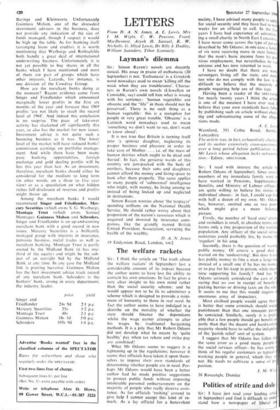The welfare rackets
Sir: I think the article on 'The truth about the welfare rackets' (6 September) lost a considerable amount of its impact because the author seems to have lost the ability to contain his own emotions. In fact he gives a very clear insight to his own mind rather than the social security scheme; and he would appear not to be fit to administer a scheme which is designed to provide a mini- mum of humanity to those in real need. In fact the author seems to have indulged in a diatribe on the morality of whether the state should finance the dependants whilst the wage earner attempts to alter his wages by traditional bargaining methods. It is a pity that Mr Robert Odams did not develop what he meant by 'quite healthy' pay when tax rebate and strike pay are combined!
What Mr Odams seems to suggest is a tightening up in the regulations; however it seems that officials have taken it upon them- selves to impose their own standards of determining whether people are in need. Per- haps Mr Odams would have been a better author had he made positive suggestions to protect public funds without imposing intolerable personal embarrassment on the majority of people who really deserve assis- tance. As for officials 'rushing' around to give help I cannot accept this kind of re- mark. As a lay official for a benevolent society, I have advised many people to app for social security and they have had to wai weeks for an official to call. In the fi% years I have had experience of administer ing a small charity in North East Lancashire I have never come across the type of perso described by Mr Odams; in one case a fatal' of six were receiving more in state benefit that the man's basic income from his pre vious employment, but nevertheless he ssa anxious and has now returned to work.
I have no doubt that there are man scroungers living off the state; and man too who do not comply with the law: it difficult to believe that the majority o people requiring help are of this type.
Having been a reader of the SPECTATO for nearly twenty years I think the articl is one of the meanest I have ever read: believe that your own standards have falle by publishing such an article without check ing and substantiating some of the alleg: tions made.
A. E. LeIli Warnford, 351 Colne Road, Burnley Lancashire The article was, in fact, exhaustively checked and its author extensively cross-question over a long period before publication: it t Mr Lewis whose allegation lacks substantia tion.—Ed itor, SPECTATOR.
Sir : I read with interest the article b Robert Odams (6 September). Since sever members of my immediate family work o have worked in Pensions, Supplementar Benefits, and Ministry of Labour offices. am quite willing to believe his stories individual abuses : in fact, I could cap hi with half a dozen of any own. Mr. Odan has, however, omitted one or two poin which might give a more butane picture.
Firstly, the number of 'hard core' crook and swindlers is small, in absolute terms, an forms only a tiny proportion of the workin population. Any officer of the social servi ministries could probably list, by name, th `regulars' in his area.
Secondly, there is the question of wastin public money. Of course a good deal wasted on the 'undeserving'. But does it co less public money to fine a man a large su instead of a small one if he has no mone or to pay for his keep in prison, while mea time supporting his family? And has t Odams seriously considered the cost of e suring that no one in receipt of benefit picking berries or driving taxis on the side It seems to me that this would require a enormous army of inspectors.
Most civilised people would agree that is better that some criminals should esca punishment than that one innocent per be convicted. Similarly, surely it is prefe able that a few people should get benefit u justly than that the decent and hardworkin majority should have to suffer the indignitt of the 'parish relief' sort of system.
I suggest that Mr Odams has fallen in the same error as a good many people the social services offices—he has come think of his regular customers as typical working people in general, which they a not. He needs to cultivate a sense of pi portion.
I. M. Wig 38 Roseangle, Dundee






































 Previous page
Previous page